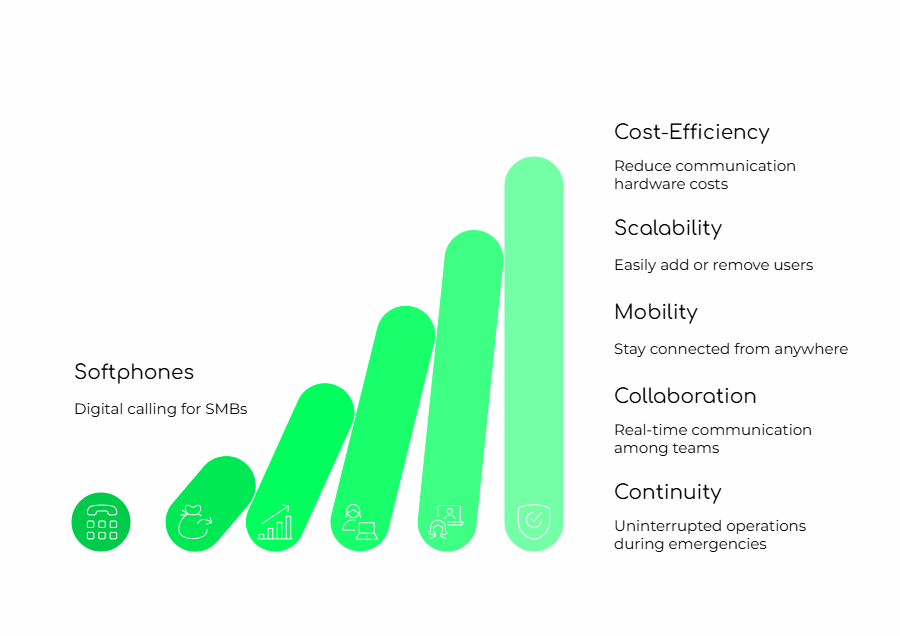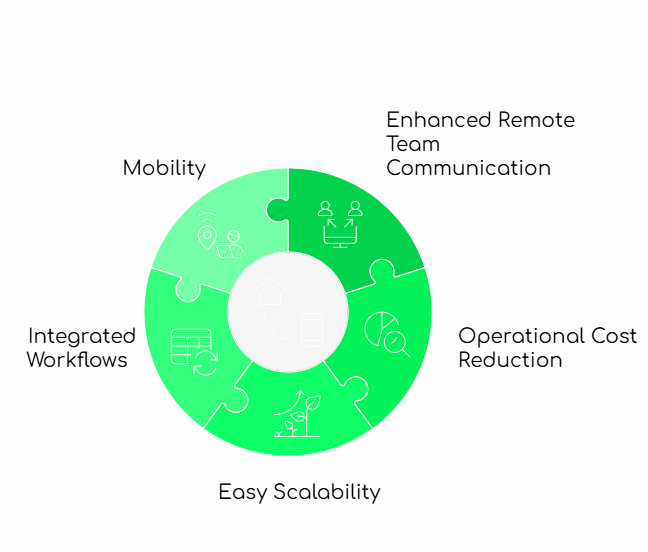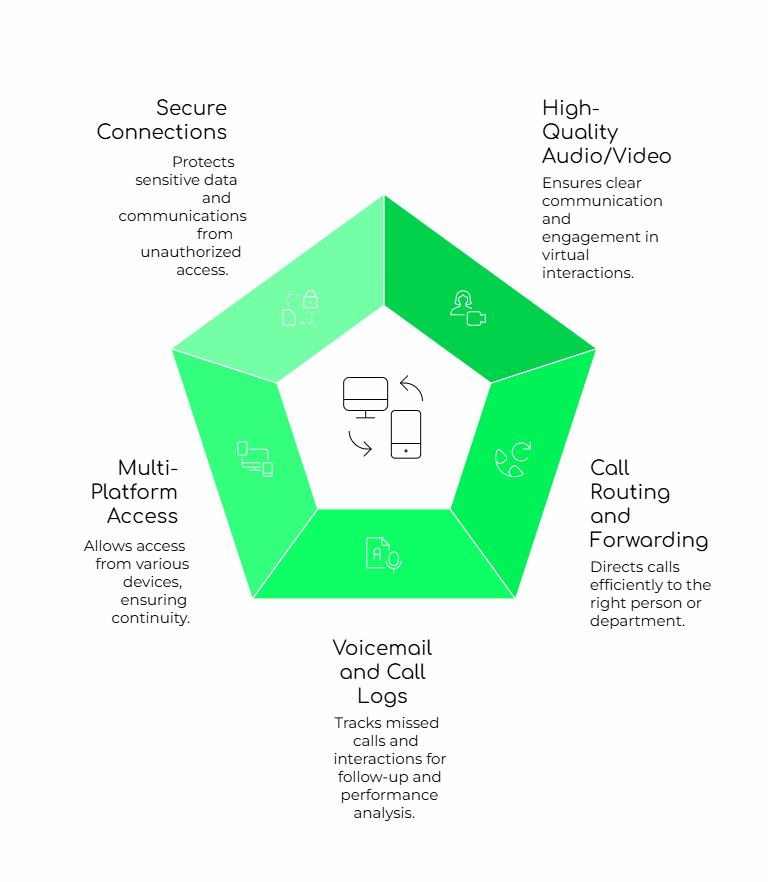How can small and medium-sized businesses in India stay connected and competitive while managing remote teams across diverse locations and time zones? In a landscape where work is no longer confined to office cubicles, ensuring seamless communication among distributed teams has become a top priority. Traditional landlines and PBX setups fall short when it comes to flexibility, cost, and mobility. As a result, SMBs across India are turning to cloud-powered alternatives like softphones to facilitate Remote Team Communication. Softphones offer the ability to call, chat, or video conference through internet-connected devices, eliminating the need for expensive hardware or complex installations.
In a country as vast and diverse as India, where team members may operate from metros like Mumbai and Bengaluru to tier-2 cities or remote regions, softphones ensure consistent and reliable communication. They allow businesses to unify communication channels, boost responsiveness, and maintain a professional presence regardless of location. More importantly, softphones support features that are vital for Remote Team Communication, including call forwarding, CRM integration, analytics, and mobile accessibility.
Table of contents
Why Softphones Are Crucial for SMBs in India?
Small and mid-sized businesses (SMBs) in India are navigating a fast-changing work environment where agility, cost-efficiency, and flexibility are essential for survival and growth. The rise of hybrid and fully remote teams has made traditional PBX systems outdated, as they rely heavily on physical infrastructure and fixed lines. Softphones, digital calling applications that run on mobile phones, laptops, or desktops, offer a smarter alternative. These tools leverage the country’s growing internet infrastructure to deliver seamless voice communication, even in rural and semi-urban regions. As more businesses in India expand their reach beyond physical locations, softphones enable constant connectivity, greater mobility, and business continuity without costly hardware or downtime.

With improved access to high-speed internet in Tier 2 and Tier 3 cities, SMBs can now scale operations without being limited by geography. Softphones also allow for centralized call management, real-time collaboration, and integration with CRM tools to keep sales and support workflows efficient. For businesses juggling resource constraints and growing customer demands, this technology acts as a digital equalizer. FreJun offers a Softphone Implementation that is tailor-made for Indian SMBs, combining powerful features, local support, and low setup effort to help teams communicate smarter, faster, and with confidence.
9 Best Softphone Service Providers in the Indian Subcontinent
Key Benefits of Softphone Use in Remote Work
Softphones are transforming the way Indian SMBs approach communication, especially in remote or hybrid settings. Their flexibility, cost-effectiveness, and ease of deployment make them an ideal fit for fast-growing businesses. Here’s a deeper look into their core benefits:

- Enhanced Remote Team Communication: With softphones, remote and hybrid teams can stay in sync effortlessly through real-time voice and video calls. High-quality audio ensures professional interactions with clients, while internal meetings become more collaborative, bridging the gap between teams spread across geographies.
- Operational Cost Reduction: Traditional PBX systems require significant investment in hardware, cabling, and ongoing maintenance. Softphones eliminate these costs by working on existing devices like smartphones and laptops.
- Easy Scalability: Growing businesses need tools that scale with them. Softphones make it simple to add or remove users as needed no complex installations or technician visits required. Whether you’re onboarding new team members or restructuring departments, Softphone Implementation offers the flexibility to adapt in real time.
- Integrated Workflows: Softphones integrate seamlessly with business-critical platforms such as CRM systems, helpdesks, and project management tools. This integration ensures that all communication is contextual and trackable, improving both efficiency and customer experience. Fo
- Mobility: One of the biggest advantages of Softphone Implementation is mobility. Employees can take business calls from anywhere, whether they’re traveling, working from home, or at a client site. This supports a more agile workforce and ensures that opportunities are never missed due to location constraints.
This adaptability makes softphones a natural fit for Indian SMBs managing Remote Team Communication in diverse business settings.
Must-Have Features for Effective Remote Collaboration
Softphones offer a flexible, device-agnostic solution that helps remote teams stay connected and productive. But not all softphones are created equal. To truly support and enhance business operations, particularly in the context of modern distributed teams, certain features are non-negotiable. These features collectively ensure that your team remains agile, collaborative, and professional, regardless of location. Below are the must-have features that enable high-performing, resilient, and secure communication for SMBs relying on effective Remote Team Communication.

1. High-Quality Audio/Video
High-definition voice and video are the foundation of effective virtual meetings and interactions. Crystal-clear audio reduces misunderstandings, while stable video enhances engagement and human connection, something remote teams often miss. This visual and auditory clarity helps maintain professionalism during both internal team check-ins and external client presentations. In the realm of Remote Team Communication, this feature makes virtual interactions just as effective as in-person ones.
2. Call Routing and Forwarding
Call routing allows businesses to direct inbound calls to the right person or department automatically. Whether a support agent is working from home or a salesperson is traveling, this feature ensures customers and colleagues are never left waiting. Forwarding calls to mobile devices or other extensions adds flexibility without compromising responsiveness. It streamlines Remote Team Communication by removing delays and routing errors from the workflow.
3. Voicemail and Call Logs
Even the most attentive teams will occasionally miss a call, but that doesn’t mean the communication stops. Voicemail systems that convert messages into audio files or transcribe emails allow users to follow up promptly. Meanwhile, call logs provide transparency, helping teams track interactions, measure performance, and improve service. These tools are crucial for asynchronous workflows and time-zone-spanning Remote Team Communication.
4. Multi-Platform Access
In today’s work-from-anywhere culture, employees often switch between devices, laptops at home, mobile phones on the go, or desktops at a shared workspace. Softphones that offer multi-platform compatibility ensure that team members can access their business phone line from any device, maintaining continuity. This seamless transition supports effective Remote Team Communication, regardless of hardware or physical location.
5. Secure Connections
Security is a critical concern, particularly for businesses handling client data, sensitive internal communication, or financial transactions. A reliable softphone must provide encrypted voice and data transmission to ensure all conversations remain confidential. In addition, secure login credentials and two-factor authentication prevent unauthorized access. For businesses serious about safeguarding their Remote Team Communication, robust security features are a must.
FreJun’s Value for Indian Small and Mid-Sized Teams
FreJun is purpose-built for Indian SMBs striving to modernize communication without complicating operations. With a feature-rich, user-friendly platform, FreJun addresses everyday challenges like managing distributed teams, reducing call dropouts, and enabling smarter workflows. Here’s how FreJun supports seamless and scalable communication:

1. Localized Support
FreJun ensures that small and mid-sized businesses in India feel supported from day one by offering customer service and onboarding in regional languages.
- Teams across India can access onboarding materials in their preferred language.
- Support agents are trained to assist with both technical and operational queries.
- This makes platform adoption faster and more inclusive, especially in Tier 2 and Tier 3 cities.
2. Compliance-Ready Infrastructure
FreJun’s infrastructure is designed to meet India’s telecom and data protection regulations, making it a reliable partner for long-term communication needs.
- Servers and voice infrastructure comply with local data residency and security policies.
- End-to-end encrypted voice channels ensure private and secure conversations.
- No external dependencies mean faster routing and better call quality for Indian users.
3. Smart Routing
FreJun offers intelligent call routing tailored to geography, business hours, and team workflows, minimizing wait times and missed connections.
- Automatically directs calls to available agents based on caller location or department.
- Business hour-based routing prevents calls from going unanswered during off-hours.
- Supports IVR flows and call queues for a professional caller experience.
4. CRM Integrations
To streamline workflows, FreJun integrates with popular Indian business tools, enabling sales and support teams to work smarter, not harder.
- Syncs seamlessly with Zoho, Freshdesk, and other CRM platforms.
- Auto-logs call data and notes directly within the CRM.
- Enables click-to-call and real-time customer context during every interaction.
5. Quick Onboarding
FreJun’s easy setup ensures your team is live and productive with minimal delay, no IT bottlenecks, and no confusion.
- No-code setup allows non-technical users to get started independently.
- Guided walkthroughs and templates simplify IVR and call flow configuration.
FreJun is more than just a softphone platform; it’s a strategic communication partner for Indian SMBs. With its localized focus, regulatory readiness, and smart automation, FreJun transforms how teams collaborate and connect. For businesses seeking reliable and scalable Remote Team Communication, FreJun stands out as a trusted and forward-looking choice.
Strategic Implementation for Better Performance
To ensure success with your softphone rollout, consider these steps:

1. Evaluate Existing Tools
A successful softphone rollout begins with a deep dive into your current communication ecosystem. This means identifying bottlenecks like missed calls, inconsistent connectivity, or lack of integration with existing tools. When businesses understand what’s holding them back, they can better define how softphones will fill those gaps and enhance operational workflows.
2. Involve Stakeholders
For a smooth transition to softphone systems, it’s important to involve cross-functional stakeholders early on. Sales, support, operations, and IT teams each bring unique insights into their communication needs. Gathering their input ensures that the solution supports real-world use cases and avoids adoption hurdles. With buy-in from all departments, implementation becomes smoother and more effective, ultimately strengthening the foundation for robust Remote Team Communication.
3. Prepare the Network
Voice communication over the internet demands a reliable infrastructure. Before rollout, evaluate your internet speed and router capabilities. Optimizing your setup with Quality of Service (QoS) settings ensures voice traffic is prioritized, reducing latency or call drops. For businesses supporting Remote Team Communication, this step is crucial to maintain clarity and consistency across teams, especially those operating from different regions or home offices.
4. Train Employees
Effective adoption relies on well-informed teams. Provide simple, role-specific training that includes visual walkthroughs and quick-reference guides. When employees understand how to navigate the softphone interface and apply its features in daily operations, productivity rises. This clarity reduces friction and ensures that Remote Team Communication remains smooth and uninterrupted as the organization scales.
5. Monitor and Optimize
Once the system is live, tracking performance is key. Use built-in dashboards and call analytics to monitor system usage and identify areas for improvement. Whether it’s adjusting call flows or refining permissions, data-driven decisions keep communication agile and aligned with business goals. Continual optimization reinforces the value of softphones and ensures long-term success in managing Remote Team Communication.
Key Takeaways
Softphones are revolutionizing Remote Team Communication for small and mid-sized businesses across India by offering a seamless, device-agnostic solution that bridges the gap between remote employees, clients, and partners. By eliminating the need for costly hardware and enabling flexible communication from any location, softphones empower SMBs to maintain a professional brand image, streamline workflows, and improve responsiveness. As India continues to adopt hybrid work models and expand its digital infrastructure, softphones stand out as a practical, scalable, and cost-effective communication tool tailored to modern business needs.

FreJun amplifies this transformation by delivering a softphone solution built specifically for the Indian market. Its local language support, regional CRM integrations, and compliance-ready systems ensure that SMBs can implement the technology without friction. More than just a vendor, FreJun acts as a long-term partner in growth, enabling businesses to expand across geographies, support distributed teams, and maintain consistent communication standards. Whether you’re aiming to serve customers better or streamline internal coordination, FreJun’s platform supports every step of your Remote Team Communication journey.
Final Thoughts
India’s dynamic business environment demands communication tools that are as flexible and scalable as the companies driving its growth. As hybrid and remote work become the norm, relying on traditional phone systems can limit a company’s ability to adapt, collaborate, and grow. The modern workforce needs tools that support instant, secure, and reliable connections, especially when Remote Team Communication is no longer optional but a business-critical function. Softphones are quickly emerging as the backbone of this shift, offering an infrastructure that aligns with the new ways Indian SMBs operate, both internally and externally.

FreJun offers more than just technology; it offers transformation. With a deep understanding of India’s regulatory landscape, regional communication needs, and evolving market demands, FreJun’s cloud-based softphone solution delivers unmatched flexibility and user-friendliness. It empowers businesses to connect teams effortlessly, serve customers better, and reduce operational complexity, all without expensive hardware or rigid infrastructure. Whether a company is scaling its operations or simply looking to modernise its communication, FreJun ensures that every interaction is smooth, professional, and aligned with long-term success in the era of Remote Team Communication.
Further Reading – US VoIP Number Implementation for International Trade in Saudi Arabia
FAQs
Softphones provide seamless communication through voice, video, and chat across devices, helping teams stay connected, collaborate efficiently, and maintain productivity while working remotely.
Yes, many softphone systems offer multilingual support, including Indian languages, making it easier for teams across different regions to navigate and use the system comfortably.
These systems are built to scale. As businesses grow, users and departments can be added effortlessly without needing new infrastructure, ensuring consistent communication across the organization.
With intuitive interfaces and guided setup processes, many businesses can go live within a few days, allowing for a smooth and fast transition from traditional systems.
Most modern softphones are designed for compatibility with popular Indian business tools like CRMs, accounting software, and helpdesk platforms, ensuring a unified workflow.
